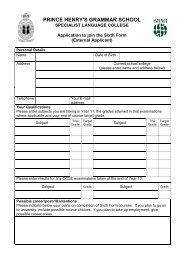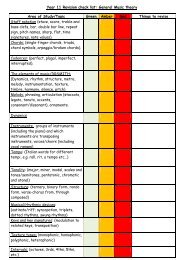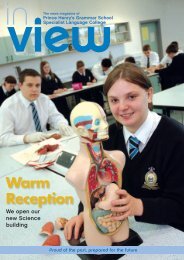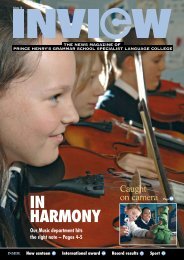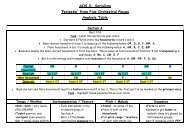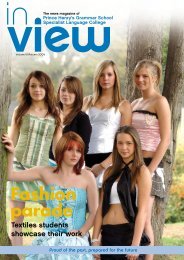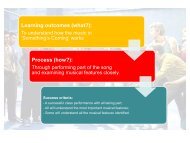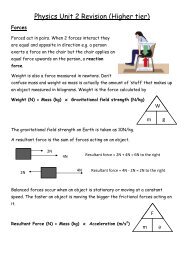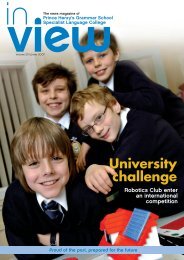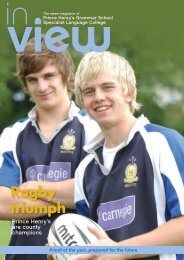PTI NS 2 12-2 14 - Prince Henrys Grammar School
PTI NS 2 12-2 14 - Prince Henrys Grammar School
PTI NS 2 12-2 14 - Prince Henrys Grammar School
- No tags were found...
You also want an ePaper? Increase the reach of your titles
YUMPU automatically turns print PDFs into web optimized ePapers that Google loves.
The new English baccalaureateThe Government published the White Paper; ‘The Importance of Teaching’, that ‘outlines a direction oftravel on the curriculum and qualifications which allows us to learn from and outpace, the world’s best’.In order for us to be compared with the world’s best, the Government has introduced ‘the EnglishBaccalaureate to encourage schools to offer a broad set of academic subjects to age 16, whether or notstudents then go down an academic or vocational route.’In order for students to be awarded the new English Baccalaureate (EBacc) they must achieve aminimum of grade C at GCSE in:English, Maths, Science (Double award), a Modern Foreign Language and a Humanities subject.Students at <strong>Prince</strong> Henry’s can meet the requirements of the EBacc by following any one of the threepathways available.Pathway A: Traditional; students will include History or Geography in their options choices along with 2further option subjects.Pathway B: <strong>School</strong> based Flexibility; students can opt to complete the EBacc by selecting either Historyor Geography alongside their BTEC courses.Pathway C: College based Flexibility; students can opt to complete the EBacc by selecting either Historyor Geography alongside their college course.4
Can the school guarantee that I will be given my firstchoice of subjects?Every attempt will be made to give you the subjects of your choice but we ask you to select a range ofsubjects in order of preference so we can best meet the needs of every student. Students will probablyremain in their present mini-schools for the teaching of Mathematics, English, Science, PhysicalEducation, Religious Studies, and Foreign Languages. However, in order to satisfy the needs of asmany students as possible, it will be necessary for some students to be taught in the other mini-schoolfor some optional subjects.Examinations aheadMost of the subjects shown on the option sheet will be assessed by the General Certificate of SecondaryEducation (GCSE). All GCSE courses follow nationally agreed guidelines that cover course objectives,content and assessment methods. In many subjects there is a choice of papers that gives candidates ofall abilities the chance to show how well they can do.Students selecting the ‘Increased Flexibility’ option will take B.T.E.C courses that are assessed andtaught in a different way compared with GCSE subjects. In most cases the final qualification is currentlyequivalent to a GCSE. Grades in BTEC courses are usually Distinction* – Distinction – Merit – Pass –Fail.A small number of students will be more suited to an Entry Level Certificate course in some subjects.These courses are designed for students who may find the content and assessment of GCSE coursestoo difficult and may benefit from a different approach.All other subjects follow a two year linear course leading to final examinations in summer 20<strong>14</strong>. Most ofyour subjects will be assessed partly by examination and partly by controlled assessment. It is veryimportant that you work consistently hard throughout the course, organize your time properlyand meet all the deadlines for handing in work.The Sixth FormThe Sixth Form is the natural progression at 16 years of age. This school has an ‘open’ Sixth Form inthat we try to provide courses for a range of abilities. Many students come back into the Sixth Form totake Advanced Level Courses (AS/A2/Applied A-levels).Some students combine AS/A2 and Applied A-Levels.Entry to the Sixth Form (and to any other further educationestablishment) will depend upon the grades you obtainin your GCSE/BTEC examinations - another importantreason to work hard and achieve your potential.5
Confused by the Abbreviations?Examination BoardsA.Q.A.W.J.E.C.EDEXCELOCRBTECAssessment & Qualifications AllianceWelsh Joint Education CommitteeThe London based Examination BoardOxford, Cambridge and RSA ExaminationsBusiness and Technical Education CouncilExaminationsAS Advanced Subsidiary GCE (normally taken in Year <strong>12</strong>)A2 Advanced GCE (normally taken in Year 13)Applied A-LevelAdvanced Level courses in more practical subjectsG.C.S.E.General Certificate of Secondary EducationNational CurriculumEBaccK.S. 3English BaccalaureateKey Stage 3: students aged 11-<strong>14</strong> (Years 7-9)K.S. 4 Key Stage 4: students aged <strong>14</strong>-16 (Years 10-11)Tiers The different levels at which most examination papers are takenDiary of EventsTuesday 17 th January 20<strong>12</strong>Monday 6 th February 20<strong>12</strong>Year 9 Options EveningYear 9 Parents’ EveningThursday 9 th February 20<strong>12</strong> Option Forms due in on this date6
Compulsory Subjects:English Page 8Mathematics Page 9Science Page 10Modern Foreign Languages Page 11Physical Education Page 30Religious Studies Page 31Personal and Social Education(including Careers, Health Education, Enterprise,Work Related Learning and Citizenship)7
ENGLISHCurriculum Leader Ms A CunniffeAssistant Curriculum Leader in charge of Key Stage 4 English Mrs R MelcherAQA: GCSE ENGLISH / ENGLISH LITERATURE Syllabus A (Dual Award)The Course will lead to the award of two GCSE qualifications, in English and English Literature, at theend of two years’ study.Subject ContentBuilding on skills gained in years 7, 8 and 9, you will be given the opportunity to produce writing for anumber of audiences, to read pre-19<strong>14</strong> prose, poetry, non-literary and media texts and to practice yourspeaking and listening. There are two pathways:GCSE English Language and English Literature which gives you 2 GCSEsGCSE English, which is a single GCSE.During the course, you might be asked to test your ability by carrying out such diverse tasks as writing aformal letter or creating a magazine advertisement. You will also have opportunities to explore film andunderstand the way that film-makers create meanings.You can study a range of writers including William Shakespeare, Wilfred Owen and Arthur Miller.Speaking and listening tasks can range from debates on cultural issues, talks on a favourite hobby,drama work based on tests studied to presentations on film clips.Scheme of Assessment4 controlled assessments = 40% of final markSpeaking and Listening assessments = 20% of final markEnglish Exam = 40% of final mark2 English Literature Exams = 75% of final markWJEC Entry Level Certificate in EnglishThis course will lead to the award of an Entry Level Certificate in English at the end of two years’ studyand is intended to be aimed at students who will be unlikely to achieve a grade at GCSE.8
MATHEMATICSCurriculum Leader Mr P. AkroydeAQA: GCSE MATHEMATICSThe specification content of all GCSE mathematics syllabuses is determined by National Curriculumstatements of attainment and programmes of study; there are four attainment targets:TargetMa1Ma2Ma3Ma4TitleUsing and Applying MathematicsNumber and AlgebraShape and SpaceData HandlingScheme of AssessmentAssessment for the GCSE will be by terminal examinations during the summer of 20<strong>14</strong>. Students willenter either the Higher Tier, for which grades A* - C are available, or Foundation Tier, for which grades C– G are available.Students will be in appropriate sets throughout Year 10 and 11 and there will regular assessments builtinto the sceme of work to allow careful monitoring of progress and necessary intervention to ensure allstudents have the opportunity to achieve their potential.Help and supportYou have access to the website www.mymaths.co.uk which provides comprehensive guidance relatingto GCSE mathematics. The site enables you to go over work you may not have fully understood whenfirst taught in class. The site also allows you to complete online homework set by your teacher and tohelps you practice in preparation for your exams. The website provides both you and your parents withfeedback on your progress and consequently is an invaluable resource to help prepare you for yourexaminations. You will be issued with both school and personal login details at the start of the academicyear. If you or your parents have specific concerns about your progress you must contact your mathsteacher.The school will stock a combined Revision Guide/ Workbook priced £3.50 and a Mathswatch RevisionDVD priced at £4.50. We would strongly recommend that you purchase these for your owm particular tierof exam.9
SCIENCECurriculum Leader Mr R OldroydSubject Leader for Biology Dr T FirthSubject Leader for Chemistry Mr P PopeSubject Leader for Physics Mr D HughesAQA: GCSE SCIENCE & ADDITIONAL SCIENCESScience is one of the National Curriculum core subjects and so is taken by all students in years 10 and11. It is a very important subject that teaches knowledge and skills relevant to everyday life and a widerange of careers.Subject ContentYou will split your science lessons into Biology, Chemistry and Physics and these will be taught byseparate teachers.Scheme of AssessmentYou will complete exams in Biology, Chemistry and Physics and these will count towards 75% of yourfinal grade. The exams will test your knowledge of the ideas covered in lessons.You will develop your skills throughout your science education and these will be assessed usinginvestigative skills assessments (ISAs). These test your ability to carry out an experiment and to analyseyour results. The ISAs will count for 25% of your final grade.Everyone will achieve at least two GCSEs in science and if you make good progress then you couldachieve three GCSEs. The GCSEs will be either:Science and Additional ScienceOrBiology, Chemistry and PhysicsProgression and CareersAfter following your GCSE Science course it is possible to take A-levels in Biology, Chemistry, Physicsand Psychology, Applied Science and Health and Social Care.There are obviously numerous careers that ask for scientific qualifications including working in the Healthservice or with animals, the food and drinks industry and engineering.10
MODERN FOREIGN LANGUAGESCurriculum Leader for MFL Mrs J BarberSubject Leader for French Ms R LongSubject Leader for German Mrs A KerrySubject Leader for Spanish Mrs B HarperAs we are a Specialist Language College, we are very fortunate to be able to provide a Key Stage 4curriculum where students can opt to study two languages to GCSE level.You will continue to study your first Modern Foreign Language (French or Spanish).AQA: GCSE FRENCHAQA: GCSE SPANISHYou will learn to cope with a variety of situations that may arise whilst visiting a French or Spanishspeaking country, or hosting a French or Spanish speaking visitor at home. The four skills of Listening,Speaking, Reading and Writing will be developed through the study of four themes. These are subdividedinto a number of different topics:LifestyleLeisureWork and EducationHome and EnvironmentAssessment is by end-of-course examination, in Listening and Reading where there are two tiers of entry(Foundation and Higher). Your written skills will be assessed by the submission of the best twoassignments from your portfolio. You will demonstrate your Speaking skills by again submitting the bestexamples of your oral assessments, which will be carried out throughout the two-year course, conductedand marked by your class teacher and sent to the exam board for moderation.The emphasis of the course is on practical communication, and you only learn French or Spanish thatmay be used for real purposes. The courses provide a sound base for the skills and language requiredfor work, leisure and, where appropriate, further study in the language. You may also have theopportunity to participate in an exchange visit in an appropriate country. As part of your course you willwork in the interactive ICT suite and will be able to further develop your speaking and listening skills byworking with a native Foreign Language Assistant.AQA: GCSE GERMANBy selecting German as one of your Option subjects, you may gain a full GCSE qualification in thislanguage. As a student in a Specialist Language College, you are also one of a few students nationallywho are able to leave school with a full GCSE qualification in two major Modern Foreign Languages.The course content is the same as that outlined for GCSE French and Spanish above. You will spendtime working with our native Foreign Language Assistant, and many of you will have the opportunity totake part in an exchange visit to Germany.11
Options SubjectsIncreased Flexibility CoursesArtArt (Sculpture Studies)Business StudiesDesign & Technology: Resistant Materials TechnologyDesign & Technology: Food TechnologyDesign & Technology: Product DesignDesign & Technology: Textiles TechnologyDramaGeographyGermanHistoryInformation TechnologyMedia StudiesMusicPhysical EducationReligious Studies**All students will study Religious Studies as part of the Key Stage 4 statutory requirements<strong>12</strong>
INCREASED FLEXIBILITYSome students prefer an assessment system with fewer written examinations, teaching which reflectstheir preferred learning style, and a more practical approach. The Increased Flexibility Pathway givesthem this option. The key elements are:One option from a choice of <strong>School</strong> or College based BTEC courses. The option subjecttaken will be more practical, will be assessed by more internal assessment rather thanexternal examinations, and will suit those students who prefer to learn by ‘doing’.One additional option subject taken alongside the college BTEC courses.Two additional option subjects taken alongside the school based BTEC courses.All courses are assessed by continuous assessment, with no formal writtenexaminations.All the courses offered are well-established, nationally recognised, two-year accredited courses in arange of vocational areas. Each course gives a broad introduction to a vocational area, but continues toprovide a general education by concentrating on key skills such as literacy, numeracy and informationtechnology.Six of the courses will be taught mainly in school – Art and Design, Business Studies, Media , Health andSocial Care, Information and Creative Technology and Performing Arts – the rest are delivered by LeedsCity College (formerly Park Lane) at their Horsforth or Leeds site and Leeds College of Building. This willbe the eighth year in which we have worked in partnership with the colleges and we have established asuccessful relationship leading to excellent results.The programme provides clear progression pathways into further and higher education and is designedto suit students who want to both add breadth to their studies and enter more specific occupationalareas. There are many examples of students who have successfully followed this pathway and have, atthe end of Year 11, moved on to higher level courses at college.The table below shows the courses on offer, approximate GCSE equivalence and possible careerpathways:In school provisionSubject GCSE point equivalence ProgressionPass Merit Distinction Distinction*BTEC Art andDesign (taught inschool)BTEC BusinessStudies (taught inschool)1 GCSE atgradeC1 GCSE atgradeC1 GCSE atgradeB1 GCSE atgradeB1 GCSE atgradeA1 GCSE atgradeA1 GCSE atgradeA*1 GCSE atgradeA*Graphic design,illustration, textiles,photography, film andanimation, interiordesign, landscapedesign.Working in the world ofBusiness, Retailing,Marketing, Finance andAdministration. Settingup your own business.13
BTEC MediaStudies (taught inschool)1 GCSE atgradeC1 GCSE atgradeB1 GCSE atgradeA1 GCSE atgradeA*Media Industries,Advertising, Television,Newspapers, Film.BTEC Health andSocial Care (taughtin school)1 GCSE atgradeC1 GCSE atgradeB1 GCSE atgradeA1 GCSE atgradeA*Social care, childcare,nursery nursing.BTEC Informationand CreativeTechnology (taughtin school)BTEC PerformingArts (taught inschool)1 GCSE atgradeC1 GCSE atgradeC1 GCSE atgradeB1 GCSE atgradeB1 GCSE atgradeA1 GCSE atgradeA1 GCSE atgradeA*1 GCSE atgradeA*Web design, Gamedesign, Graphic design,Computer ProgrammerMusical Theatre, TheatreManagement, MusicPerformanceCollege ProvisionSubject GCSE point equivalence Progression1 GCSE atGrades G – A*Construction(taught at LeedsCollege of Building.Public & uniformedservicestaught at Leeds CityCollege)Animal care(taught at LeedsCity College)Horticulture(taught at LeedsCity College)Beauty Therapy(taught at LeedsCity College)Catering(taught at LeedsCity College)Motor VehicleTechnology(taught at LeedsCity College)1 GCSE atGrades G – A*1 GCSE atGrades G – A*1 GCSE atGrades G – A*1 GCSE atGrades G – A*1 GCSE atGrades G – A*1 GCSE atGrades G – A*Post 16 progression to BTEC Level 2/3Diploma in Construction leading tooccupations within the industry includingcarpentry & joinery, painting & decorating,general building, surveying or ground works.Post 16 progression to Public Services level2/3 courses, leading to occupations suchas: Armed Forces, Police/EmergencyServices, Local and Central GovernmentPublic AdministrationPost 16 progression to Level 2/3 coursesleading to occupations in the Animal Careindustry, Veterinary Practice, AnimalNursing, Kennels, Catteries and Zoos.Post 16 progression to Level 2/3 coursesleading to occupations in the Countryside,Environmental Management, LandscapeGardening, Nurseries, Garden Centres andMarket Gardening.Post 16 progression to Level 3 coursesleading to occupations within the BeautyindustryPost 16 progression to level 2/3 coursesleading to occupations in the Motor andEngineering industry including motor vehicletechnician, body shop repair, MOT andServicingPost 16 progression to Level 2/3 coursesleading to occupations with the catering &hospitality industry including ProfessionalChef, Front of House, Butchery, CreativeBakery & Patisserie.We may be able to provide limited places on other courses through ‘in-fill’ (taking up spare places onexisting courses) – if there are other courses in which you have an interest, please speak to MrsRobinson (Student Services Manager) and add them to the Application Form.<strong>14</strong>
AssessmentPractical issuesBoth school and college are anxious that parents and students are kept informed about progress on thecourse. Regular attainment and attendance reports will be available and feedback will be given atParents’ Evenings.Application and SelectionWe have successfully negotiated a limited number of places on the programme, and students will haveto be interviewed by the College to assess their commitment and suitability prior to acceptance on thecourse.TransportYou are expected to travel to and from college using public transport and will be informed about the busstops and route numbers required. We will operate a ‘dry run’ before the course commences. Allstudents are expected to obtain a half-fare bus pass and parents will be reimbursed for the cost of busfares at the end of each term.15
ArtCurriculum Leader Mr S GreenAssistant Curriculum Leader Mr N LowAQA: GCSE ART AND DESIGN GCSESubject ContentYou will embark upon a course which, from the start, will teach you a range of skills and approaches toset themes. In Year 10 you will have experience ofPAINTING using watercolour and acrylicsDRAWING using pencil, oil pastel, chalks and charcoalCLAYWORK both relief and 3DPRINTING in black and white and also in colourCO<strong>NS</strong>TRUCTION using a range of materialsThe aim of the course is to develop your individual skills while also encouraging you to work in animaginative and self-motivated way. Your individuality will be both nurtured and celebrated. As anintegral part of the course you will be taken on a day art trip in Year 10 to either the Yorkshire SculpturePark or Leeds Art Gallery and this will be used as a starting point for one of your projects back in school.Scheme of AssessmentYour examination at the end of Year 11 will consist of a month long preparation period leading to a 10hour piece of work completed in school over two full days. This will count as 40% of your final GCSEgrade; the remaining 60% will be a portfolio of coursework (generally three projects) from Years 10 and11.In Year 11 you will be strongly encouraged to develop a personalized approach to you work when youwill develop a range independent research skills.You will be welcomed onto this course if you are willing to work hard, be creative and respond to advicegiven by your course tutors.If you need more information, please talk to your Art teacher.This course cannot be taken with the 3-Dimensional Art course described on the next page.16
ArtCurriculum Leader Mr S GreenAssistant Curriculum Leader Mr N LowAQA: GCSE SCULPTURE STUDIESSubject ContentYou will be introduced to a variety of experiences exploring a range of three-dimensional media,techniques and processes, including both traditional and new technologies.You will use relevant images, artefacts and resources relating to art, craft and design from the past andfrom recent times, including European and non-European examples which will be integral to theinvestigating and making process. Responses to these examples must be shown through practical andcritical activities which demonstrate the your understanding of different styles, genres and traditions.You are required to work in one or more areas of three-dimensional design such as those listed belowwhere you may explore both overlapping areas and combinations of areas:CeramicsClay workPotterySculptureConstructionCarving in wood, stone and plasterModelingSite specific Conceptual ArtIn support of your sculptures you will use photography, ICT and a wide range of drawing and printingtechniques.The aim of the course is to develop not only your individual skills, but also to encourage you to developimaginative and self-motivated ideas and projects. Individuality will be celebrated. As an integral part ofthe course you will be taken on a day art trip in Year 10 to either the Yorkshire Sculpture Park or LeedsArt Gallery and this will be used as a starting point for one of your projects back in school.Scheme of AssessmentThe examination at the end of Year 11 will consist of a month long preparation period leading to a 10hour piece of work completed in school over two full days. This will count as 40% of your final GCSEgrade; the remaining 60% will be a portfolio of coursework (generally three projects) from Years 10 and11.In Year 11 you will be strongly encouraged to develop a personalized approach to you work when youwill develop a range independent research skills.You will be welcomed onto this course if you are willing to work hard, be creative and respond to advicegiven by the course tutors.If you need more information, please talk to your Art teacher.This course cannot be taken with the Art course described on the previous page.17
BUSINESS STUDIESCurriculum Leader Mrs B HallAQA: GCSE BUSINESS STUDIESThe world of business affects each and every one of us on a daily basis. Whether you have ambitions towork in Business or set up your own business, this course will give you a valuable insight into howbusinesses operate and will also help develop the skills needed to be successful for a career inbusiness. The course will also challenge your opinions and views on more serious issues such as: Howethical is Primark?Subject ContentThere are three key elements to the courseUnit 1 – Setting up a BusinessUnit 2 – Growing as a BusinessUnit 3 – Investigating BusinessThe specification has been designed to make full use of a range of teaching and learning methodsincluding ICT, case studies, role play, business simulations and discussion/debate. The coursedevelops key skills such as communication, problem solving, analysis, critical analysis and evaluation.Scheme of AssessmentThe Course is assessed by:Examination: Two written 1 hour papers, Unit 1 representing 40% of the marks, Unit 2representing 35% of the marks.Controlled Assessment:A business investigation based upon a pre-released case study.SummaryBusiness Studies is a highly topical GCSE which will offer you a really dynamic, interesting and relevantcourse as well as developing a detailed insight into the world of work. It provides an ideal platform for arange of A Level options that you can go on to study including Business Studies, Economics, AppliedBusiness, Law and Accountancy as well as providing a strong foundation for a range of career options.18
DESIGN and TECHNOLOGYCurriculum Leader Mrs A BlakeleyCourse Leader Mr R MathewsonAQA: GCSE RESISTANT MATERIALS TECHNOLOGYThis is a two-year course leading to the award of a full GCSE in Resistant Materials Technology. Thecourse fulfils the Design and Technology National Curriculum requirements.Subject ContentThe course will develop your design and technology skills in practical ways by making high qualityfunctioning products. You will use your designing abilities and enhance your graphical communicationtechniques by using CAD (Computer Aided Design) to develop your ideas and CAM (Computed AidedManufature) for some finished products. During the course, the projects will involve you in developingyour skills in the use of wood, metal and plastic. A variety of tasks will be completed, including theinvestigation of industrial manufacturing techniques. The final extended task will allow you to use yourexpertise and knowledge to design and make a high quality finished product.Scheme of AssessmentExamination: One written paper 2 hours (40%) – this is externally markedCoursework: One extended Design and Make project (45 hours: 60% of the final mark)If you have enjoyed Technology over Key Stage 3, GCSE Technology is the subject for you. It combinesboth designing and practical skills. In the past you have handled wood and other materials, but in theGCSE course you will be taught higher level skills in the manipulation of plastics, metals and woods togenerate your own designed products. The department has specialised equipment to assist you here, aswell as highly advanced computer software that you will be taught to use to its full potential.The course is designed to enable all students, both boys and girls, to reach high levels of success. It isan excellent preparation for the AS/A2 course in Product Design, our exciting course offered in the SixthForm.19
DESIGN and TECHNOLOGYCurriculum Leader Mrs A BlakeleyCourse Leader Mrs A BlakeleyAQA: GCSE FOOD TECHNOLOGYThis is a 2 year course leading to the award of a full GCSE. The course fulfils all of the Design andTechnology National Curriculum requirements.Subject ContentThis course is a progression from the work undertaken at Key Stage Three and offers you a good insightinto the food industry. It will prepare you for a job within the industry, and perhaps more importantly itgives you the necessary skills that are required for adulthood. Year ten follows a series of short projects,focusing on a bakery project, multicultural foods and foods of the future. In previous years students havebeen able to study for a nationally recognised certificate in food hygiene (there may be a charge for thisif you decide to study for this optional certificate). Year 10 offers you the opportunity to enter into theRotary Club Cookery Competition. This involves designing and making a two course meal for under £10and is judged by the Rotary Club. The cash prizes for this competition are substantial with the winnerand runners up winning £50, £30 and £20.The final year of the course allows you to specialise in a particular area and design a new food product.You will get the chance to work with specialist computer software and hardware. All areas are related tothe food manufacturing industry as well as the domestic setting.At least half of your lessons will revolve around practical work giving you the opportunity to enjoy makinga variety of dishes whilst learning about the subject.All the design and make activities that you will undertake will result in useable and useful food products.Scheme of AssessmentExamination: One written paper- 2 hours (40%) – this is externally markedCoursework Project:One extended project lasting for 45 hours (60% of the final mark)The coursework project is a ‘design and make’ activity that will result in auseable and useful food product, for example to design and make a chilleddessert or a main meal.If you enjoyed Food Technology in Key Stage 3, are interested in how food is both made andconstructed and you are keen to learn new skills and techniques, then Food Technology could be thecourse for you.This course is popular with both boys and girls, it is an excellent preparation for the AS / A2 course inFood Technology. Many pupils also choose to take this course as a chance to balance their academicstudies with practical work, it offers an excellent range of coursework, theory and practical sessions.A GCSE in Food Technology can provide a pathway to careers in the Food Industry, Food Science,Dietetics, Nutrition, Sports Nutrition, New Product Development, Teaching, Environmental Health andMicrobiology.20
DESIGN and TECHNOLOGYCurriculum Leader Mrs A BlakeleyCourse Leader Mrs D SmithAQA: GCSE PRODUCT DESIGNThis is a 2 year course leading to the award of a GCSE. The course fulfils the Design and TechnologyNational Curriculum requirements.Subject ContentThis course is aimed at developing your skills and expertise in the designing and making of products tofit clients’ needs. CAD/CAM (Computer Aided Design/Computer Aided Manufacture) and ICT areimportant elements of the course as are skills in graphic design, creativity and imagination. You willinvestigate materials and manufacturing processes used both in school and in industry.You will work on 3 mini design and make projects in Year 10. These will include: a sustainable souvenirproject with Harewood House; interior designing for Starbucks/Costa involving screen printing; andentering a national competition run by ‘PrintIT’ to design graphics to promote Fair trade in supermarkets.All these will prepare you for your Major Project.The Major Project will consist of a 20 sheet coursework folder and matching product finished to aprofessional standard, good enough to be sold in shops. You are actively encouraged to develop yourown style and way of working and perhaps more importantly, to be able to work independently – a lifeskill essential for your future working life.Scheme of AssessmentExamination:Coursework:One written paper- 2 hours (40%)– this is externally markedGeneric Paper – Section A: Design Question; Section B: Subject KnowledgeOne extended project lasting for 45 hours (60% of the final mark)If you like being creative and using both artistic and graphic skills in your work; if you like exploring newtechnologies and completing projects where you will use a lot of different materials, then GCSE ProductDesign could be the course for you.A GCSE in Product Design can provide a pathway to careers in Architecture, Engineering, GraphicDesign, Buying, Merchandising, CAD design, Technician, Interior Design, Product Design, SurfacePattern Design and Fabric Design.The course is designed to enable both boys and girls, to reach high levels of success. It is an excellentpreparation for the AS/A2 course in Product Design, offered in the sixth form.21
DESIGN and TECHNOLOGYCurriculum Leader Mrs A BlakeleyCourse Leader Mrs G WilliamsAQA: GCSE TEXTILES TECHNOLOGYThis is a 2 year course leading to the award of a full GCSE. The course fulfils all the Design andTechnology National Curriculum requirements.Subject ContentThis course is aimed at developing your skills to design and make functional products which have theirmaterial base in Textiles Technology. You will increase your awareness and knowledge of textilemanufacture, marketing, production, costing and product development. You will also explore a range ofdesign activities using CAD/CAM (Computer Aided Design/Computer Aided Manufacture) to generateideas and implement your designs. You will develop skills using CNC (Computer Numerical Control)embroidery machines and a range of surface/pattern decoration. There will also be opportunity for youto investigate construction and pattern making which will help you understand how to make threedimensional textile products.Scheme of AssessmentExamination:Coursework:One written paper- 2 hours (40%) – – this is externally marked.One extended project lasting for 45 hours (60% of the final mark)If you like being creative and experimenting with a range of decorative techniques; if you feel you wouldenjoy learning how to use a sewing machine to make your own clothes or even become the next GianniVersace, Alexander McQueen, Giorgio Armani or Vivienne Westwood, then this could be the course foryou.At GCSE in this subject can provide a pathway to careers in Fashion Design, Illustration, Pattern Cutting,Fashion Retail, Journalism, Merchandising, Buying, Public Relations, Arts And Crafts, Creative Textiles,Theatre and Costume Design,The course is designed to enable both boys and girls, to reach high levels of success. It is an excellentpreparation for the AS/A2 course in Textile Technology, offered in the sixth form.22
DRAMACurriculum Leader Mrs S CollinsOCR: GCSE DRAMASubject ContentA great deal of hard work, intense concentration and thoughtful input is required from all who choose totake this subject. As a Drama GCSE student will find that there is now far more emphasis on the writtenpart of the work to support your practical tasks and to demonstrate understanding of text and knowledgeof theatrical terms and conventions.Drama continues to be regarded as an essentially practical subject and an interactive one, where anability to work and negotiate with others is essential. The heart of the course lies in the processes thatare gone through on the way to a solution to a given problem or task, rather than the assessment of anend product. However, the way in which you arrive at a piece of finished drama will determine both thequality of the drama itself and the quality of the supporting working records.Most people are now familiar with the concept of improvisation in drama and this technique, with itsattendant requirements of adaptability, imagination and creativity, form a large part of the course. Duringthe course, you will be expected to explore texts by different playwrights by using language, reasoning,drama conventions already learned, skills and experience. At GCSE level ‘form’ (how the drama ispresented) takes on a much greater significance and should enhance the effectiveness of the content.Written work is in the form of a working notebook/diary and three Working Records that support yourpractical work, where you analyse the practical work that you have undertaken in lessons and describein detail the dramatic process you have been involved in for each of the 3 units of the examination:Unit 1Unit 2Unit 3From Page to Stage: Performance of Text and Working RecordDrama in the Making: Workshop presentations and Working RecordFrom Concept to Creation: Preparation and exploration; 10 hour practicalexamination; performance to the examiner; individual Working Record.Scheme of AssessmentYour progress is closely monitored throughout the course. You will undertake three units of work each ofwhich will require you to explore the work through four approaches: Deviser; Designer; Director;Performer.UNIT 1 Your knowledge, understanding and skills will be achieved through a series of workshops usingselected scripts. You will be assessed on your performance and Working Record.UNIT 2 You will explore key aspects of the devising process and gain confidence in applying thesewhen working with a stimulus, issue or theme . Your working process on the stimulus should cover the 5stages of: Preparation; Exploration; Rehearsal; Workshop Presentation; Review. You also submit aWorking Record on this Unit.UNIT 3 The focus of this unit is to further develop your skills through a series of workshops based onstimulus material from the Exam Board, which explore in detail the contexts of: DESIGNER, DEVISER,DIRECTOR and PERFORMER. At the end of the unit, you will undertake a practical examination,comprising of a preparation/rehearsal period and a practical outcome. You will be assessed on yourperformance/presentation and your Working Record.The O.C.R. syllabus prepares you not only for the examination, but also teaches you important skills forlife beyond school. For example, how to listen, how to discuss and negotiate with others, how to presentyourself confidently and how to empathise with others.23
GEOGRAPHYCurriculum Leader Mr P LewisEdexcel: GCSE GEOGRAPHYSpecification B The Evolving PlanetSubject ContentGeography is an important subject in the development of the skills and understanding needed to makesense of a rapidly changing world. The specification chosen is a contemporary “issues” based syllabuswhich looks at how the world we live in is changing and what the likely consequences of the changesare. Tackling issues such as climate change, flooding, changing cities and the changing world of work,this course equips students with the knowledge and skills needed to become true global citizens. Thecourse delivers all the key transfereable skills of literacy, numeracy, data handling and ICT, which areseen as valuable both in higher education and the workplace. It has strong links with a range of othersubject areas and can be successfully studied in almost any combination of subjects. As well as beinguseful it is also fun, engaging, interactive and relevant!Scheme of AssessmentWe are currently awaiting final confirmation of the course content from the Exam Board. The units in thetable below represent the current course studied and we envisage the new specification to containsimilar topics. Assessment for the GCSE will be by terminal examinations during the summer of 20<strong>14</strong>.Paper/Component Content ExaminationUnit 1 DynamicplanetTectonic HazardsBiosphereAtmosphereHydrosphereExtreme EnvironmentsUnit 2 People andthe PlanetUnit 3 MakingGeographicaldecisionsUnit 4 ResearchingGeographyCoasts or RiversLiving SpacesMaking a livingPopulation DynamicsManaging ResourcesWorld of WorkChanging Urban or Rural areasAssesses your ability tounderstand data and informationto make decisions. The theme isreleased at the start of the courseand the pack of pre-releasedsource material is published inJanuary.You complete a fieldworkinvestigation and report on tasksprovided by the board writtenunder controlled conditions withinclassFieldwork report done over aperiod of several lessons.Additional CommentsAs it is more interesting to study geographical features and processes first hand you will be required toundertake field trips as part of the course. You will develop independent learning strategies and maybecome involved in working with the range of international links that the school and department haveestablished over time. This up to date modular course is open to all students, whatever your ability,provided you are prepared to work hard.24
GermanSubject Leader for German: Mrs A KerryAQA: GCSE GERMANWith over <strong>12</strong>5 million speakers across the globe, German is one of the top ten most important languagesworldwide. Having studied the language since the start of year 8, you already have a sound understanding ofthe language which is more than enough to start the GCSE with. The course will continue to build on anddevelop your linguistic knowledge and mirror your language learning skills from either your French or Spanish.You will be able to use the skills you learn in one language to help the other and also you will double youremployability later in life. As a student in a Specialist Language College, you are also one of a few number ofstudents nationally who are able to leave school with a full GCSE qualification in two major Modern ForeignLanguages.Course ContentYou will learn to cope with a variety of situations that may arise whilst visiting a German speaking country, orhosting a German speaking visitor at home. The four skills of Listening, Speaking, Reading and Writing will bedeveloped through the study of four themes. These are sub-divided into a number of different topics:AssessmentLifestyleLeisureWork and EducationHome and EnvironmentAssessment is by end-of-course examination, in Listening and Reading where there are two tiers of entry(Foundation and Higher). Your written skills will be assessed by the submission of the best two assignmentsfrom your portfolio. These will be produced in controlled conditions throughout the course. You willdemonstrate your Speaking skills by again submitting the best examples of your oral assessments, which willbe carried out throughout the two-year course, conducted and marked by your class teacher and sent to theexam board for moderation.Extra InformationThe emphasis of the course is on practical communication, and you only learn German that may be used forreal purposes. The courses provide a sound base for the skills and language required for work, leisure and,where appropriate, further study in the language. You will also have the opportunity to participate in our highlysuccessful exchange visit to our partner school in Aachen. As part of your course you will work in theinteractive ICT suite on a regular basis and will be able to further develop your speaking and listening skills byworking with a native German Foreign Language Assistant.German is a language that is used widely in the fields of scientific development and research, business,finance and tourism. Over 60,000 new books are published in German every year, which is almost 18% of allbooks published, making Germany the 3 rd largest publisher in the world. By following the GCSE Germancourse, you will be able to expand your career prospects and your horizons and develop useful communicationskills along the way.25
HISTORYCurriculum Leader Miss K WilsonOCR: GCSE HISTORYRegardless of your ability you are welcome to consider History as a GCSE choice. You will find that theskills you have acquired whilst studying History in Key Stage 3 will help you to succeed on this popularcourse. The new GCSE course which started in 2009 builds on the strengths of the old one whilstreducing the amount of coursework that you are expected to produce. As well as being a fascinatingand worthwhile subject in its own right, a History GCSE provides a strong basis for any combination of A-levels.Subject contentYou will follow the GCSE <strong>School</strong>s History Project specifications. This provides you with a breadth ofinteresting and worthwhile topics.Germany 1919-1945: an in-depth study, looking mainly at the rise of Hitler and life in Nazi Germany(examined); or American West 1840 – 1895 an in depth study, looking mainly at the way in which theAmerican West was settled and developed (examined).Medicine through Time or Crime and Punishment through time: an opportunity to study a theme across along historical period (examined).Students may have the opportunity of visiting the Thackray Medical Museum in Leeds during the courseand Fountains Abbey which will provide an opportunity to study this local historical site and how its usehas changed across time (coursework).Scheme of AssessmentExaminations75% of the course is examined across two papers. The first consists primarily of questions based on‘Medicine through Time’ and ‘Germany 1919-1945’ or ‘Crime and Punishment through time’ andAmerican West 1840 – 1895’. The second requires you to consider a number of unseen sources basedon a topic you have studied. You will have already been introduced to this style of examination duringKey Stage 3 and in the past have coped with the examinations superbly.Controlled Assessment (coursework)25% of the course is assessed in the form of one piece of coursework marked by your teachers andmoderated by the examination board. You will have the opportunity to visit Fountains Abbey as part ofthat piece of coursework. This has always been a memorable day out.Additional CommentsHistory has experienced a recent surge in interest, as a glance at the television listings will reveal! It hasalways been a valuable subject which can support a range of careers including journalism, the media,the Civil Service or medicine. It helps you develop your critical and analytical skills whilst at the sametime allowing you to study fascinating and relevant topics. History is of particular importance if you areconsidering law as a career and is also useful for a number of other similar professions. In History youwill benefit from the broad academic training the subject provides.History has been a successful subject at <strong>Prince</strong> Henry’s <strong>Grammar</strong> <strong>School</strong> for some time and theDepartment intends to continue with this success in the future. Hardworking students of all ability levelshave done very well indeed in terms of GCSE grades awarded, with the support of a very experiencedteam including two Senior Examiners. The department has always offered you a professional andhardworking commitment. It expects the same from you in return.26
INFORMATION TECHNOLOGYCurriculum Leader Mr B MordueGCSE ICTFrom personal computers to smartphones, from apps to websites, all of our lives, every day, areenhanced through the use of ICT. This new course reflects this and provides students with a solidfoundation in understanding and applying this subject in their continuing study or future working lives. Italso provides students with the opportunities to develop their creativity, project management andproblem-solving skills, so, irrespective of your ability you are welcome to consider ICT as a sound GCSEchoice. The skills you have acquired so far in ICT at KS3 will have provided you with a good groundingfor this course.This ICT course provides you with the opportunity to follow ICT in the sixth form or any other subjectcombination.Subject contentYou will follow the OCR ICT Level 2 Exam Board Specification:Unit 1 Understanding computer systems: this core unit contains a range of mini projects that includea: Internet challenge; DTP advertising campaign; database project; PPT task and spreadsheet model.Unit 2 Using ICT to create a business solution: this unit builds on your existing knowledge ofcomputers to reflect the working practices of the real business world.Unit 3 Introduction to Computer Programming: gain additional skills and develop knowledge andunderstanding of the use of programming and scripting to enable computer systems to solve problems.Unit 4: Creating an interactive product: creating a website and multi-media product. You will developand demonstrate creative flair by combining multimedia components to create vibrant, energetic orstimulating interactive product for a webpage.Scheme of AssessmentExaminationsThe course is mainly practical and has one examination worth 25%. The nature of the tasks emphasisesproblem solving and designing. The new units for 20<strong>12</strong> include programming and web design; theseare in-line with the government’s new recommendations for ICT in secondary education. Webelieve these fantastic additions better prepare our students for the world of tomorrow.Additional CommentsICT has had incredibly good results over the last few years and this course may provide access to awide range of university courses and employment opportunities.27
MEDIA STUDIESCurriculum Leader Mrs S EllisWJEC: GCSE MEDIA STUDIESSubject ContentAlthough you have never had Media Studies lessons you already know a great deal about MediaStudies. You probably spend a significant proportion of your time consuming Media ,whether it bechecking your friends out on facebook, listening to Leona Lewis on your ipod, or watching the latestJames Bond film at the cinema or watching The X Faxtor on TV. From Facebook to Futurama, from EdEdd and Eddie to Eastenders and from The Matrix to Match of The Day , the Media play an increasinglyimportant role in our lives and it is important to understand the role they play in the culture and economyof the country we live in .During the course you will study a range of media which could include, Film, comics, Magazines, TV ,Newspapers , Video games, websites, the music industry and social networking sites.In 20<strong>14</strong> the examination will focus on TV Crime Drama and Magazines.Scheme of AssessmentCoursework 60% Examination 40%Candidates are assessed on THREE pieces of Coursework.2 textual investigations1 Media Production consisting of research , planning, the production itself and an evaluation of theproduction.Your coursework folder must be completed by February in Year 11.You will also sit a 2 hour 15 minute examination at the end of year 11We currently offer the option to take GCSE Film Studies in conjunction with Media Studies. This is avoluntary option as it involves 2 extra examinations and extra coursework.To succeed on and enjoy this course, students must be able to combine critical skills with animaginative and creative approach to the work. The best Media Studies students are enthusiastic,dynamic and work independently. Students are encouraged to pursue their own creativeinterests and the media cameras and editing suite are available at lunchtimes and after school forstudents to make their own films and programmes .28
MUSICCurriculum Leader Mrs L GreenwoodEdexcel: GCSE MUSICSubject ContentThe course is practical in nature with a strong emphasis on performance and composition. In Musiccourses in Years 7, 8 and 9 students will already have experienced many different ways of composingmusic, and these will now be developed to a higher level. Compositions can cover a wide spectrum ofcomplexity from simple keyboard pieces to larger scale instrumental or vocal pieces. As students areexpected to fulfil the performance element of the course, they must either play an instrument already orbe prepared to begin learning to play one. Alternatively, they could sing.The course is intended to be relevant to those who simply enjoy making music at whatever level, as wellas those who may wish to pursue Music to a higher level beyond Year 11. Students will experiencemany styles of music via four areas of study:Western Classical Music (1600-1899)Music in the 20 th CenturyPopular Music in ContextWorld MusicStudents will be expected to become familiar with Music Technology equipment as well as moreconventional methods of music making.Scheme of AssessmentAssessment is in THREE parts:A 1hour 30 minutes LISTENING TEST at the end of the course, which involves answering questions onset works pupils have been studying throughout the course (40%)Submission at the end of the course of TWO COMPOSITIO<strong>NS</strong> or ARRANGEMENTS(30%)TWO PERFORMANCES, for which each candidate must play or sing individually and as part of a group.(30%)Controlled Coursework DetailsCoursework must be completed in controlled conditions by Easter in Year 11. As a department we alsorequire regular submissions of completed compositions every term; the performing skills of students willalso be regularly assessed by the department during the course.In addition, GCSE Music students have available at PHGS a wide range of extra-curricular ensembles,via which they can become better performers. It is expected that they play/sing in one ensemble. Theyare also entitled to free musical instrument/vocal tuition in school.Music is widely regarded as providing many of the skills necessary for a rounded, creative personality. Apractical course in Music develops many skills for which employers are looking, including adaptability,physical co-ordination, confidence, co-operation, and the ability to be inventive. As well as theseimportant life skills, the study of music enhances understanding and appreciation of music throughoutlife.29
PHYSICAL EDUCATIONCurriculum Leader Mrs S GrantEdexcel: GCSE PHYSICAL EDUCATIONIs this the right subject for me?The GCSE Physical Education course will appeal to you if you:have a keen interest in sport and recreation and always look forward to your PE lessonstake part in sport/recreation outside of class timewant to follow a course that develops knowledge and understanding through practicalinvolvementwant to know more about the benefits of sport and exercisewant to study a course that is active and that you will enjoyare considering a sports-related career or an A level/higher education courseWhat do I need to know, or be able to do, before taking this course?The course builds on the knowledge, understanding and skills you established in Key Stage 3 PhysicalEducation. It will give you exciting opportunities to be involved in a number of different physicalactivities, promoting an active healthy lifestyle. You can perform in one or all of the following roles:player/participant; leader or official. You should have an interest in PE and sport, enjoy being active andappreciate the benefits of keeping fit and healthy.What will I learn?You will:develop your knowledge and practical skills in a range of physical activitiesexamine the effects of exercise and how training can improve performancefind ways to improve your own performances in a variety of rolesidentify ways to develop and maintain a healthy and active lifestyle through participation inphysical activity.appreciate the benefits of promoting ‘sport for all’How will I be assessed?The GCSE course is assessed over two unitsUnit 1 is externally assessed through a written examination paper of 1 hour 30 minutes. This willcontribute a maximum of 40% towards your total marksUnit 2 is assessed in two sections:Section 1 – four practical performances in the role of either player/participant, leader or official. You canachieve 48% of the marks from your four performances, two of which may be in the role of official orleader.Section 2 – analysis of performance in one of the chosen activities. This will be worth <strong>12</strong>% of the marksand should include planning, performing and evaluating a Personal Exercise Programme. This is theonly piece of written coursework.If you’d like more information please talk to Mrs Grant and/or visit www.edexcel.com30
Religious studiesCurriculum Leader Ms L WalshAQA: GCSE Religious StudiesReligious Studies is a compulsory Foundation curriculum subject throughout Primary and Secondaryeducation. At <strong>Prince</strong> Henry’s you will have the opportunity to gain recognition for your study by sitting afull GCSE qualification.Subject contentThe GCSE programme of study begins in year 9 and covers the study units:The Existence of GodMiraclesThe Problem of Evil and SufferingIn year 10:ImmortalityScience and ReligionIn year 11:Prejudice and DiscriminationPlanet EarthReligion and WarEarly LifeExamination and AssessmentYou will take two GCSE modules which are worth 50% of the qualification each, the first at the end ofyear 10 and the second at the end of year 11. All students are entered for the same paper with theopportunity to gain grades from A* to G. There is no coursework.Additional CommentsReligious Studies is an engaging, stimulating and intellectually demanding course. It is a wellestablishedacademic subject, highly regarded by universities and professions such as journalism, socialcare and community work, childcare and education, police work, business and law, and diplomatic work.It allows you the opportunity to discuss, think deeply, reflect upon, assess and critically analyse differentopinions and views on people’s beliefs in an atmosphere of mutual tolerance and respect. Due to theinteresting and contemporary content of the course, you will have a very positive attitude towards thesubject and enjoy the varied discussions and debates which are at the heart of the Religious Studiescurriculum.Religious Studies is also a popular subject at A-Level, offering a course in Philosophy and Ethics.31
NameYear 10 Options 20<strong>12</strong> - 20<strong>14</strong>Pathway B – <strong>School</strong> based FlexibilityFormYou will study 3 subjects on this pathway and you are asked to select 5 subject preferences now.From this, 3 subjects will be selected to form your timetable. We will do our best to meet yourrequirements, but cannot guarantee to do so. Where changes are necessary we will see eachstudent individually to discuss alternatives.If you wish to study 2 BTEC courses and 1 GCSE course; choose a maximum of 3 subjects fromthe Increased Flexibility Curriculum and choose 2 subjects from the Wider CurriculumIf you wish to study 1 BTEC course and 2 GCSE courses; choose a maximum of 2 subjects fromthe Increased Flexibility Curriculum and choose 3 subjects from the Wider CurriculumDo not choose the same subjects in both BTEC and Wider Curriculum.Please tick the box below then choose no more than 5 subjects in total, with your first choiceshown as (1), your second as (2) etc.I wish to study 2 BTEC and 1 GCSE courseI wish to study 1 BTEC and 2 GCSE coursesIncreased FlexibilityArt and Design (BTEC)Business Studies (BTEC)Media Studies (BTEC)Health and Social Care (BTEC)Information and CreativeTechnology (BTEC)Performing Arts (BTEC)Wider CurriculumArtBusiness StudiesDramaFood TechnologyGermanICTMedia StudiesMusicPhysical EducationProduct DesignResistant MaterialsTextilesHistoryGeographyThe timetable will be created when students have made their choices, therefore it is imperativethat this form is completed and handed to your form tutor on Thursday 9 th February 20<strong>12</strong>.
NameYear 10 Options 20<strong>12</strong> - 20<strong>14</strong>Pathway C – College Based FlexibilityFormYou will study 2 courses on this pathway, one at college and one at school. We ask you to make 3preferences now and 2 courses will be selected to form your timetable. We will do our best to meetyour requirements, but cannot guarantee to do so. Where changes are necessary we will see eachstudent individually to discuss alternatives.Choose one subject from Increased Flexibility CurriculumChoose two subjects from the Wider Curriculum (first and second choices).Choose no more than 3 courses in total, with your first choice (which should be from the IncreasedFlexibility column) shown as (1), your second as (2) etc.Increased FlexibilityAnimal Care (College)Beauty Therapy (College)Catering (College)Construction (College)Horticulture (College)Motor Vehicle Technology(College)Police and Uniformed Services(College)Wider CurriculumArtBusiness StudiesDramaFood TechnologyGermanICTMedia StudiesMusicPhysical EducationProduct DesignResistant MaterialsTextilesHistoryGeographyThe timetable will be created when students have made their choices, therefore it is imperativethat this form is completed and handed to your form tutor on Thursday 9 th February 20<strong>12</strong>.



